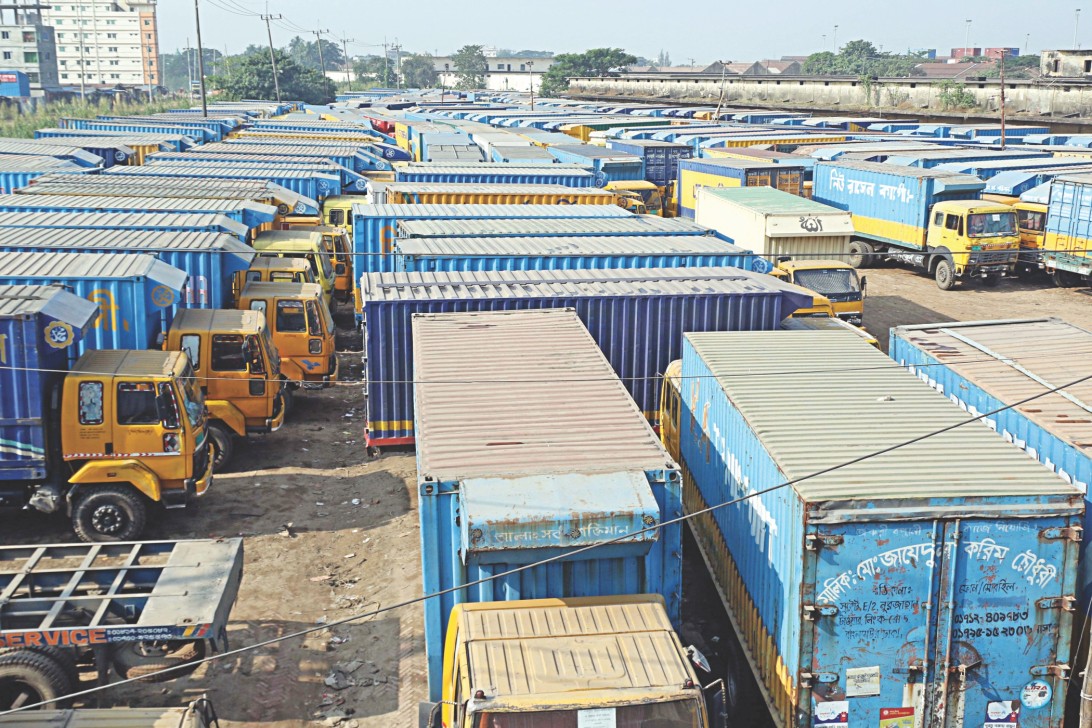Transport strike disrupts exports

A German garment buyer stayed at the Narayanganj club over the last two days for visits to MB Knit Fashion Ltd.
After completion of his visit to the factory at Fatullah in Narayanganj, the buyer was supposed to come to Dhaka by a private car yesterday. He started for Dhaka from Narayanganj at 9 in the morning.
However, the buyer’s private car was stopped at the Signboard area in Narayanganj by transport workers observing a countrywide strike, said Mohammad Hatem, managing director of MB Knit Fashion Ltd.
Later, he was taken on an alternative route but again was stopped at Sanarpar area by the transport workers.
Finally members of industrial police came forward to assist him in reaching a hotel in Gulshan in Dhaka.
Similarly, Khaledur Rahman, an owner of a garment buying house at Mirpur, was supposed to go to Narayanganj to place work orders at a factory.
But he turned back at the Shanir Akhra area witnessing vandalism of some vehicles by the protesters.
Now he is trying to manage his European buyer who has been asking for a quick shipment of goods.
Many of the garment manufacturers and exporters have faced similar kind of troubles in running factories, dealing with international buyers and sending consignments from Dhaka to the Chattogram port for shipments.
“Our staff cars were stopped on way to the office at Adamjee disrupting office hours. Workers’ buses were stopped for which the number of absentees was high today (yesterday),” said Sharif Zahir, managing director of Ananta Group, a leading garment exporter.
“Shipment trucks could not leave for Chattogram which is the biggest worry as it will lead to air shipments if we miss the cut off. If this goes beyond today we will be in a big big financial mess,” he said.
Facing troubles in transporting goods, Zahir is now negotiating with his buyers for extending the shipment period of the consignments.
“We will try for extension first if not air shipment,” he said, adding that air shipment costs usually amount to 40 percent of the value of the goods being sent. Zahir’s shipments were supposed to go to China and the UK.
“Any disruption without heads up puts strain on business,” said Sheikh Fazle Fahim, president of the Federation of Bangladesh Chambers of Commerce and Industry, the country’s apex trade body.
“All of them (garment exporters) are complaining. Even buyers are getting stuck during factory visits!” said Rubana Huq, president of the Bangladesh Garment Manufacturers and Exporters Association (BGMEA).
Most of the garment manufacturers will have to send the goods by air to meet the deadline set by the international retailers. The manufacturers cannot make any profit if he or she has to go for air shipments.
For instance, the airfare for sending one kilogramme (kg) of garments from Dhaka to the London is $3, which has to be paid by the exporter, said Hatem.
However, if goods are sent over the sea, the transport cost is completely borne by the importer, meaning exporters have to pay nothing in the regard, he said.
He said a 20-feet container can hold 10 tonnes of garment cargo and between $1,200 and $1,500 needs to be paid as fare to the shipping companies by the buyer.
However, if the same quantity of garment goods are sent through air shipments, exporters will have to pay $30,000 to the air cargo company, as air fares are not included in the pricing.
“It is very difficult to run business smoothly with a profit of just $7,000 from the shipment of 10 tonnes of garment cargo,” Hatem said. So, finally the exporters start incurring losses and gradually becoming defaulters.
Hatem said the garment factories have also been facing troubles in movement of their covered vans inside the country for the strike, for which production at factories are facing troubles.
If the strike continues for long, production in most factories will be halted and finally the shipments as well, he added.
